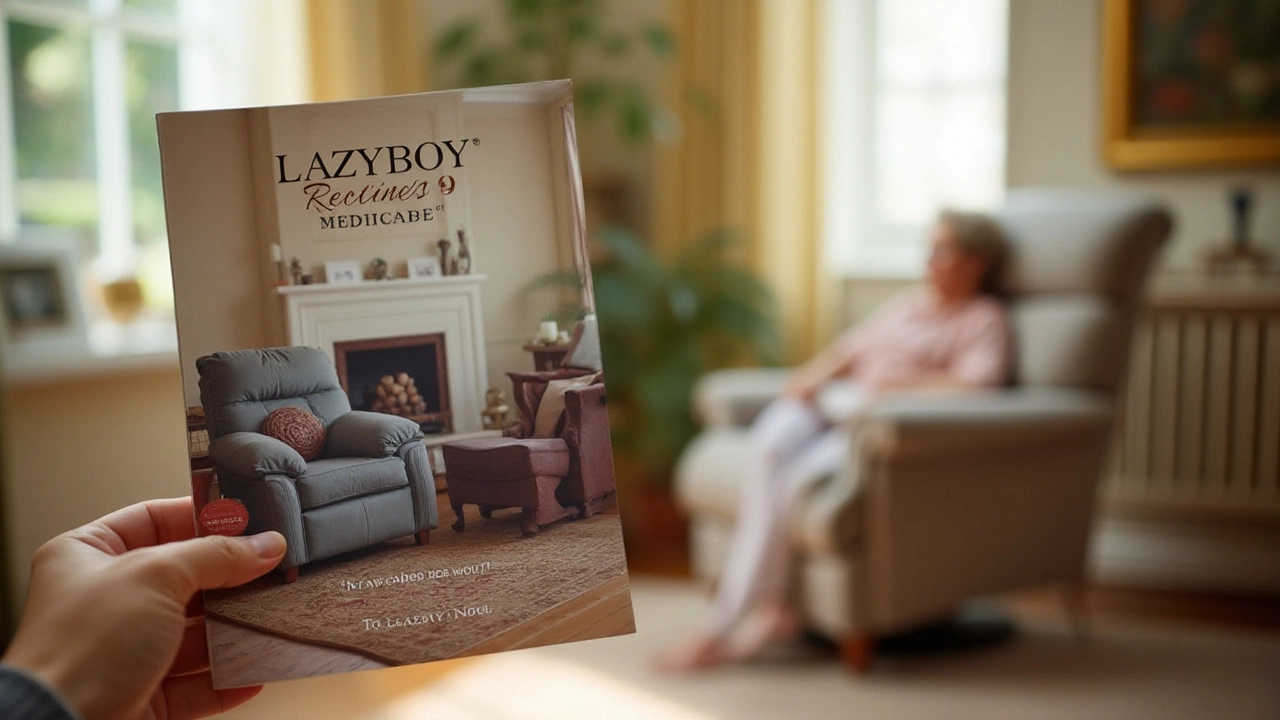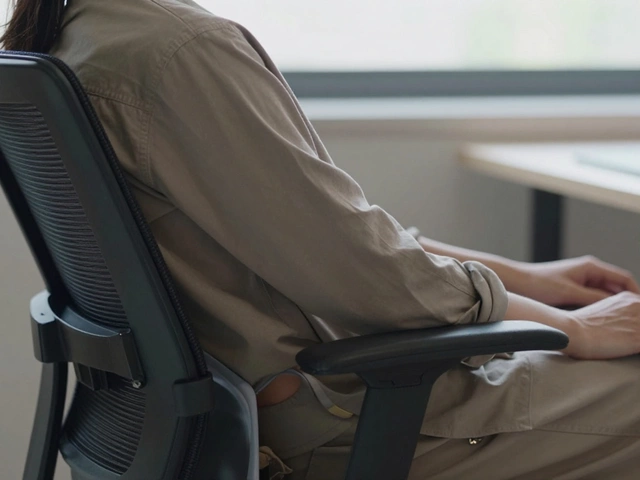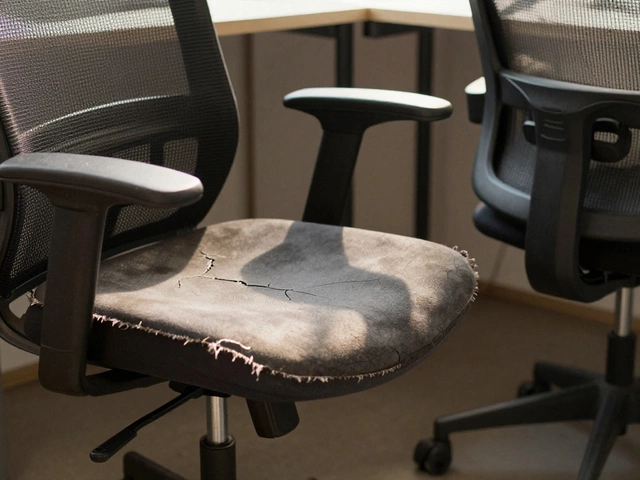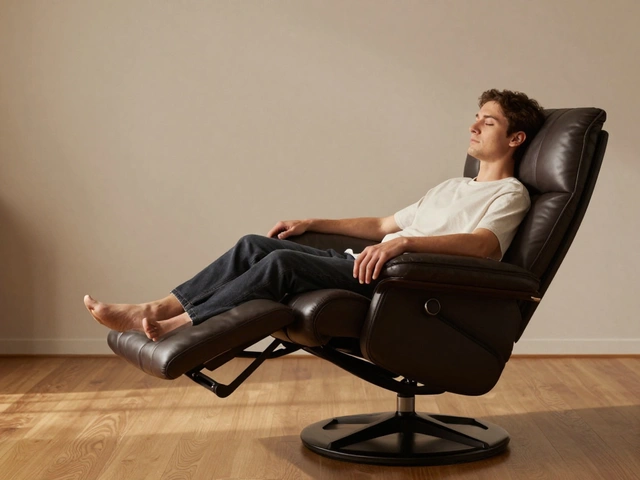When it comes to enhancing comfort at home, especially for those with medical needs, Lazyboy recliners often make it to the top of the list. Yet, there's always a lingering question: can these cozy chairs be covered by Medicare? It's a topic worth exploring as it involves important considerations around healthcare and quality of life.
Medicare, a lifeline for many seniors and those with disabilities, does cover certain medical equipment, but furniture often impacts precisely how this coverage applies. Whether it's a tilt, lift, or recline feature, understanding how these functions align with Medicare's strict guidelines is crucial. We'll navigate through the intricacies of Medicare approvals, focusing on how Lazyboy fits into the picture.
- Understanding Medicare Coverage for Furniture
- Lazyboy Recliners: Features and Benefits
- The Process of Claiming Medicare for Recliners
- Tips for Selecting the Right Recliner under Medicare
Understanding Medicare Coverage for Furniture
Many people wonder how Medicare coverage works when it comes to furniture, particularly when considering something specialized like a Lazyboy recliner. Originally designed as a healthcare benefit for medical expenses, Medicare typically focuses on necessities like doctor visits, hospital stays, and prescription medications. However, it also encompasses what is classified as Durable Medical Equipment (DME)—items that serve a medical purpose and are intended for repeated use, which can sometimes include specialized chairs.
Medicare categorically lists items that may qualify as DME under Part B, which assists with paying for outpatient services. These items often include things like wheelchairs, walkers, and other aids that help users with mobility impairments. The catch, though, is that the furniture must exhibit critical medical functionality—it's not just about comfort but explicitly prescribed for assistance due to medical conditions. A standard recliner doesn't typically qualify, but a chair with lifting capabilities might, as it helps people with arthritis or other conditions stand up safely.
Considerations and Challenges
While the idea of obtaining a medical recliner chair through Medicare might sound enticing, there are challenges involved. First, there is the element of prescription by a qualified healthcare professional; without this official backing, a claim for a chair is unlikely to succeed. Second, a substantial portion of expenses might still fall to the individual, as Medicare usually covers about 80% of approved services. The remaining 20%, even if just a fraction, can still represent a significant sum for some recliners, leading to out-of-pocket costs.
"Medicare doesn't cover furniture unless it's deemed medically necessary," says Eric Hartman, a healthcare policy analyst. "Even then, it becomes an uphill task to navigate the documentation and approval process."
For instance, in 2022, statistics indicated that less than 10% of claims for mobility-assistive seating, such as powered lift chairs, were successfully processed due to stringent eligibility criteria. While understanding these guidelines is complex, it is essential for those hoping to get Medicare's support when purchasing furniture for medical reasons.

Lazyboy Recliners: Features and Benefits
When discussing Lazyboy recliners, it’s important to first appreciate the brand's legacy of craftsmanship and comfort. Since its foundation in the late 1920s, Lazyboy has been a stalwart companion for many households seeking relaxation after a hard day's work. These recliners are more than just seats; they embody a lifestyle focused on comfort, enhancing living spaces with elegance and utility. The standout feature of Lazyboy recliners is undoubtedly their seamless blend of style and function, with each chair meticulously designed to cater to diverse needs, from sleek living room styles to medically supportive designs.
Lazyboy's innovation in recliner technology is what sets them apart. The brand offers a myriad of features tailored to individual preference and health requirements. For those wondering if a Lazyboy recliner is suitable for seniors or people with disabilities, the tilt-and-lift mechanism provides remarkable ease of use, allowing for smooth transitions between sitting and standing. Additionally, the recliners are engineered with ergonomic support in mind, helping alleviate strain on muscles and joints—a crucial benefit for users with arthritis or chronic pain. Not only do the recliners offer different angles of recline, but many models also include lumbar support and headrest adjustments, contributing to the superior comfort Lazyboy is known for.
But extensive features alone don't paint the full picture; the brand's commitment to quality and durability makes Lazyboy a top choice for those seeking long-lasting home investments. The chairs are built with robust frames and premium materials, ensuring they withstand daily use while keeping their plush appeal. Moreover, Lazyboy’s innovative fabrics resist stains and moisture, promoting hygienic use, especially in healthcare settings where cleanliness is paramount. While the cost of such a recliner might initially seem high, its durability and health benefits offer substantial value, often outlasting lesser brands by years, if not decades.
From the perspective of healthcare usage, Lazyboy recliners present immense benefits. Recognizing the role of comfortable seating in recovery and daily well-being, Lazyboy has been featured in discussions with healthcare professionals. A study highlighted in 'Journal of Rehabilitation' noted the positive impact of ergonomic furniture in patient recovery rates. One such observation noted,
"The incorporation of well-designed recliners in healthcare can aid significantly in the recovery process, providing patients with a supportive environment conducive to healing,"reflecting the profound personal and medical benefits these recliners offer.
The integration of user-friendly controls ensures that individuals can adjust their seating preferences with minimal effort. This is particularly beneficial for people with limited mobility, allowing them to achieve their desired comfort level without external assistance. For tech enthusiasts, some Lazyboy models feature smart enhancements, including USB ports for device charging and heat or massage functions, adding layers of luxury to practical design. As a result, turning an ordinary home setup into a personal oasis of relaxation and support is possible with these recliners. All the while, these features enhance the daily life of users, offering a seating solution that marries comfort, technology, and style.

The Process of Claiming Medicare for Recliners
If you're looking to understand how to claim Medicare for a Lazyboy recliner, it's vital to grasp the nuances of healthcare coverage. Medicare Part B is where the journey begins, as it covers durable medical equipment (DME) deemed necessary by a doctor. However, not all recliners fall under this category. For a medical recliner chair to qualify, it must have specific features, like a lift mechanism that helps individuals with mobility limitations stand up. The first step is a visit to your healthcare provider, who will assess your needs and determine if a recliner with such features is medically justified. With a signed prescription in hand, you can begin navigating the Medicare landscape.
The next crucial phase involves contacting a Medicare-approved supplier. Not every furniture store carries the certification needed to provide equipment under Medicare coverage, so it's imperative to find one that does. The supplier will verify the prescription and, most importantly, ensure the recliner you have in mind meets all the Medicare specifications for a DME. This step can be tricky, as Medicare coverage often differentiates between types of recliners, focusing solely on those that include essential lift functions.
Documentation and Submissions
Once the suitable Lazyboy recliner is identified, the paperwork truly begins. The supplier will aid in submitting required forms to Medicare, including your doctor’s prescription, often referred to as a Certificate of Medical Necessity. This dossier is crucial because any missing or incorrectly filled paperwork can delay or even deter the approval process. It helps to maintain open communication with your doctor and supplier, ensuring all the necessary documentation is detailed and precise. Understanding the importance of every filled field can be the difference between swift approval and prolonged waiting.
"Navigating Medicare’s intricacies for your needs can be tiresome. Equip yourself with understanding and right facilitation, and it becomes a smoother journey," advised Dr. Emily Barnes, a geriatric care expert.
Remember, the payment structure is essential to grasp. Medicare doesn't cover the total cost of the recliner. Instead, if approved, it typically covers 80% of the approved amount, with beneficiaries shouldering the remaining 20%. This balance will be clarified by the supplier once Medicare processes the paperwork. It's worth noting that supplemental insurance can aid in covering that 20%, so checking any standby policies you hold is prudent.
Appeals and Considerations
If the claim is initially denied, don't lose hope. There's an appeals process designed to ensure that each case receives a fair evaluation. Collect additional supportive documents, often from your healthcare provider, detailing why the recliner is a necessity rather than a luxury. Supply these documents through proper Medicare appeal channels, as instructed in the denial letter. Persistence is key here, as many find success upon reevaluation. It's reassuring to know that an appeal is not uncommon in these scenarios, and pursuing it with determination often pays off.

Tips for Selecting the Right Recliner under Medicare
Choosing the right recliner for medical needs, especially under Medicare, involves careful consideration and a bit of savvy shopping. With diverse options available, it’s crucial to focus on both comfort and compliance with Medicare guidelines. To begin with, thoroughly understand the necessity. Is the recliner needed to assist with getting up and down safely, reduce pain, or offer vital ergonomic support? Many Lazyboy recliners are specifically designed to address these needs, often with the ability to tilt or lift, which can be critical for certain medical conditions.
When exploring whether your choice might be Medicare approved, it’s beneficial to consult with healthcare providers or occupational therapists. They can provide insights into which features are medically necessary for your situation. This often includes assessing the user’s physical condition and outlining the essential features that align with those needs. Moreover, you should be prepared to navigate through terms like ‘Durable Medical Equipment’ (DME), which Medicare covers when deemed essential. Be aware that the definition of DME doesn't traditionally include furniture, hence special features are vital for eligibility. A study published by the Journal of Aging suggests that adaptive seating improves the quality of life significantly for seniors.
“Properly chosen medical furniture can lead to an enhanced sense of independence and overall well-being,” noted Dr. Elaine Richardson, an expert in geriatric care.
Budget considerations are another critical aspect, often intertwined with Medicare’s limitations. While Medicare might cover recliners, there’s a price cap dictated by the approval. Opting for features that drive up the cost excessively might not always be pragmatic since the out-of-pocket expenses could still be significant. It's wise to get a clear quote including the reimbursement information upfront, enabling better financial planning. Providers may offer guidance on what portion of the recliner cost Medicare might cover, but this figure can vary.
Once you've identified the necessary features, another layer of this decision puzzle involves checking the reputation and certifications of the seller or manufacturer. Reliable manufacturers like Lazyboy often have dedicated customer service teams acquainted with handling Medicare-related questions, lending greater peace of mind. Consumers should look for brands that not only provide a sturdy build but also back their products with comprehensive warranties.
In certain situations, additional accessories might be pertinent. For instance, padded armrests or extra lumbar support can sometimes be added post-purchase. However, ensure any accessory or modification sits well within the terms of Medicare guidelines, as alterations can sometimes affect the coverage status. Always keep an open line of communication with your insurer to avoid surprises.







